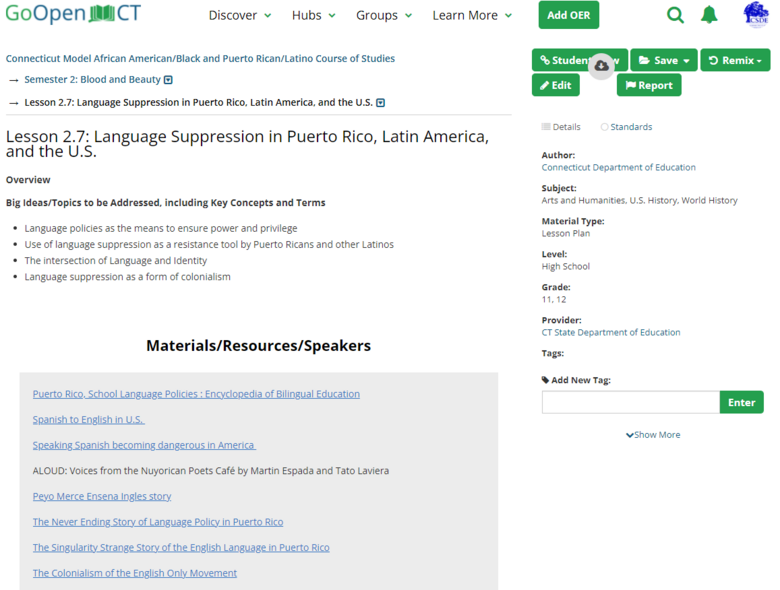Lesson 2.7: Language Suppression in Puerto Rico, Latin America, and the U.S.

Overview
Big Ideas/Topics to be Addressed, including Key Concepts and Terms
Language policies as the means to ensure power and privilege
Use of language suppression as a resistance tool by Puerto Ricans and other Latinos
The intersection of Language and Identity
Language suppression as a form of colonialism
Materials/Resources/Speakers
Puerto Rico, School Language Policies : Encyclopedia of Bilingual Education
Speaking Spanish becoming dangerous in America
ALOUD: Voices from the Nuyorican Poets Café by Martin Espada and Tato Laviera
Peyo Merce Ensena Ingles story
The Never Ending Story of Language Policy in Puerto Rico
The Singularity Strange Story of the English Language in Puerto Rico
The Colonialism of the English Only Movement
Understanding Perceptions of Language Threat: The Case of Puerto Rico, Caribbean Studies. Volume 44 No. 1-2, January-December 2016, pp. 167-186
Language and Empire: Elizabeth Kneipple’s Colonial History of Puerto Rico. Author: Solsiree Del Moral. Centro Journal, Vol 31(1), Spring 2019
President Roosevelt speech on December 11, 1906: Message Regarding the State of Puerto Rico
Bilingual Education Traces Its U.S. Roots to the Colonial Era
Recommended Learning Activities, including UDL Principles/Scaffolded Supports and Asynchronous and Synchronous Learning Opportunities
Day 1
Initiation: Begin by asking students if everyone in the U.S. should be obligated to speak English. Record their thoughts and beliefs on “English only.” Ensure that all perspectives are heard, reminding students of agreements for safe and brave learning space. (This should include reading of one article regarding Spanish language suppression in the U.S. after Lesson 2.6 Day 3.)
Activity: Choose and read a poem of resistance from ALOUD: Voices from the Nuyorican Poets Café by Martin Espada and Tato Laviera. To complement article, read and write/depict response to one of the following prompts:
How did the use of English support the notion of colonialism and assimilation for Puerto Ricans?
What were the effects or consequences of language suppression for different Puerto Ricans and Latinos?
In what ways did language suppression facilitate resistance by the Puerto Rican community to overcome?
Day 2
Activity: Students select one of the following:
Using the following quote by President Theodore Roosevelt to immigrants from the mainland: “There is no room in this country for hyphenated Americanism. ... Any man who comes here ... must adopt the institutions of the United States, and, therefore,…must adopt the language which is now the native tongue of our people, no matter what the several strains in our blood may be. It would not be merely a misfortune, but a crime to perpetuate differences of language in this country.” Write/depict synthesis about the dangers of language suppression.
Use the Language Suppression in USA summary and Final Word Protocol to discuss in small groups how language was suppressed in the U.S., incorporating own experiences or personal stories in response to the following questions:
What would you do differently if you had to deal with language suppression?
How do you advocate in ways that do not perpetuate language suppression?
Closing: Have students discuss if language suppression is happening in their high school, city/town, or state.
Home Links/Reflections to Affirm Identity
Family interview regarding beliefs and values on language of suppression.
Family members’ interviews on their experiences with language suppression.
Options for Content Continuity Across History Courses and Interdisciplinary Integration
Students read anthologies from Puerto Rico about Language suppression (e.g., Terrazo by Abelardo Diaz Alfaro available in English and Spanish.)
Video of one of the stories in Spanish and English subtitles: Peyo Mercé enseña inglés mov or Santa Clo va a la Cuchilla
Extensions/Experiential Opportunities
Advocacy Project in which students advocate for a language policy or consideration of language in current policy to support empowerment of Puerto Ricans and Latinos.